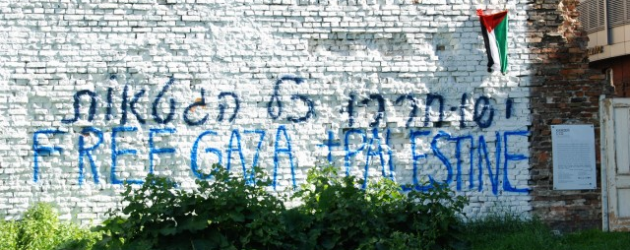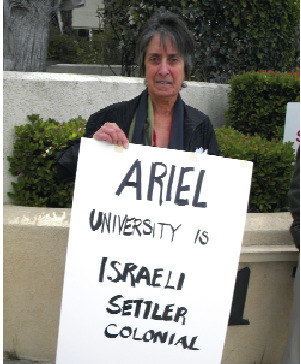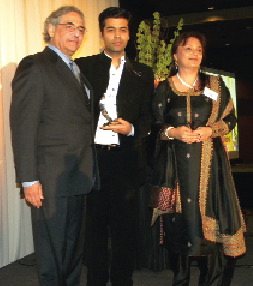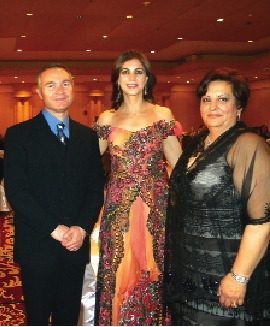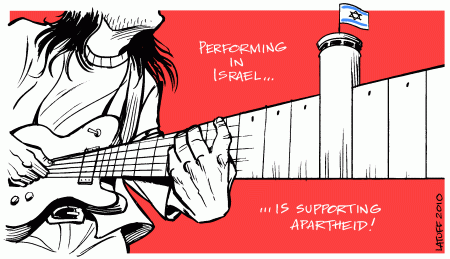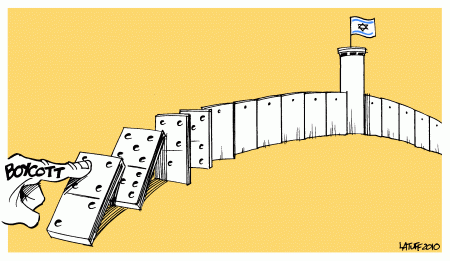EDITOR: An unfortunate name…
In Israel, is it better not to have an Arabic name, at least if you wish to be treated as a human being. The story below is only in the paper because the subject of it is a senior US academic and a former minister, otherwise we would never have heard about it. Maybe she can tell Obama about it? Fat chance.
University of Miami president detained for questioning at Israeli airport
Donna Shalala, of Lebanese descent, says she was questioned for 3 hours at Israel’s Ben Gurion Airport during visit last month.
A former secretary of the U.S. Health and Human Services Department says she was detained and interrogated at the Ben-Gurion International Airport in Israel last month.
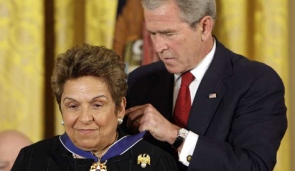
Donna Shalala, who is of Lebanese descent, is now the president of the University of Miami. She was visiting Israel in July as part of a delegation of university leaders invited by the American Jewish Committee’s Project Interchange.
Shalala stayed after the convention to meet with a group setting up a new medical school in Israel.
University spokeswoman Margot Winick said in an email that Shalala was detained as she was leaving Israel to undergo a set of security questions and a luggage search that took nearly 3 hours. But she didn’t miss her flight.
Israeli airport authority officials said there was no record of the search.
Jerusalem Torturer: IOA
By Jonathan Cook in Jerusalem, 8 Aug 2010
Doron Zahavi accused of running Israel’s Abu Ghraib
A police officer known as “Major George” who is accused of torturing Arab prisoners in his previous role as chief interrogator in a secret military jail has been appointed to oversee relations with Jerusalem’s Palestinian population, it has emerged.
The decision has been greeted with stunned disbelief from human rights groups, who say unresolved allegations against Major George that he brutally abused Arab prisoners for many years should disqualify him from such a sensitive post.
Relations between the Israeli police and the 250,000 Palestinian residents of East Jerusalem have been on a knife edge for many months, as extremist Jewish groups — backed by the municipality — have increased their settlement drive in traditional Palestinian neighbourhoods such as Sheikh Jarrah and Silwan.
The Association of Civil Rights in Israel (Acri), Israel’s largest legal rights group, revealed last week that it had made a formal complaint in February about Major George, whose real name is Doron Zahavi.
Acri said he had threatened to demolish the home of a Palestinian community activist in Silwan for leading protests against a settler takeover of Palestinian homes in the area. During what police described as a “getting to know each other session”, pressure was also put on Jawad Siyam to become an informant.
Zahavi, however, first earnt notoriety in Unit 504, a special wing of military intelligence, that oversaw the interrogation of foreign Arab nationals held in the secret prison, known as Facility 1391. Israel claims to have closed the jail following its exposure in 2003.
A Lebanese militia leader, Mustafa Dirani, who was held in Facility 1391 for many years, alleged in an Israeli court in 2004 that Zahavi repeatedly tortured him, including by sodomising him with a baton.
The civil suit for $1.5 million damages was never settled because Israel released Dirani in a prisoner swap before the court had issued a ruling. The judge has denied Zahavi’s subsequent requests to close the case.
Although Zahavi has denied the main charges, he has admitted interrogating prisoners while they were naked and that he ordered one of his officers to undress in Dirani’s cell and threaten to sexually assault him.
Several of Unit 504’s interrogators later corroborated Dirani’s claims, revealing that they routinely used the torture techniques he had described.
The case has attracted comparisons with Abu Ghraib, the prison in Iraq where US soldiers sexually abused Iraqi inmates.
Dalia Kerstein, director of Hamoked, an Israeli human rights group that helped to expose Facility 1391, called Zahavi’s appointment “appalling”.
She said the security services had a history of appointing officials who acted violently towards Palestinians to sensitive posts. The authorities’ logic, she said, appeared to be that “these people know how to deal with the Arabs because they can speak the language of violence”.
Zahavi’s new role as adviser on Arab affairs to Jerusalem’s police chief, Aharon Franco, is one of the key roles in the Jersualem force. Zahavi is supposed to act as the main channel between Palestinian residents and the police.
According to the job description, the adviser “must be an accepted and welcome figure in the Arab community, with excellent interpersonal skills.”
Melanie Takefman, a spokeswoman for Acri, said it was hard to see how Zahavi could fill such a post. “The problem in Jerusalem is that the police relate almost exclusively to the Palestinians as suspects and do not enforce the law equitably.”
Zahavi’s job in Facillity 1391 was to extract information from important Arab prisoners.
Dirani — a senior figure in Amal, a now-defunct Lebanese militia, who was seized by Israeli commandos in 1994 — was assumed to know the location of a missing airman, Ron Arad, whose plane went down over Lebanon eight years earlier.
Dirani claimed he was left naked for his first month in detention and was sexually abused repeatedly by his interrogators.
When Dirani appeared in court in 2004, he entered walking with great difficulty and aided by a cane. He told the judge of his experience of torture: “I prayed that I’d die.”
An unnamed interrogator who worked under Zahavi told the Israeli media: “I remember one instance that I still feel until today, which makes me shudder, in which a baton was used — not for hitting. Even in the field, George did what he wanted, in front of my eyes and the eyes of everyone else.”
After Zahavi was dismissed from military intelligence, he joined the immigration police and later moved into police intelligence. He is reported to have taken up his new post in the past two months.
The recent meeting with Siyam suggests that he is likely to bring an uncompromising approach to his role as a liaison with Jerusalem’s Palestinians.
Siyam said Zahavi spent most of their meeting shouting at him, and warning that a demolition order would be drawn up for Siyam’s house if he continued his political activities. Zahavi also threatened to get him fired from his job.
Although Israel claims to have closed Facility 1391, there are suspicions it and possibly other secret prisons are still in operation. In May last year the United Nations Committee Against Torture called for the location of 1391 to be identified and the prison inspected.
No bar to promotion
Zahavi is only the latest example of a security official accused of violent crimes against Palestinians later being placed in a sensitive post.
Gavriel Dahan: A lieutenant in the border police, Dahan was found guilty of carrying out a “manifestly illegal” order to shoot dead Israeli-Palestinian citizens arriving at an improvised checkpoint in 1956. In total, 47 civilians were killed at Kafr Qassem. Dahan was later appointed adviser on Arab affairs in the mixed city of Ramle.
Ehud Yatom: In the infamous Bus 300 affair in 1984, Yatom admitted using a rock to smash the skulls of two bound Palestinian teenagers who had hijacked a bus full of Israelis. Yatom was later pardoned. In 2001 prime minister Ariel Sharon appointed him his counter-terrorism adviser, though the supreme court ruled him unfit for the post. He was elected to the parliament in 2003.
Benzi Sau: A state commission of inquiry harshly criticised Sau, northern commander of the border police, for his role in the fatal shootings of 13 unarmed Palestinian citizens in 2000. The panel recommended he be denied promotion for four years. In that time he was promoted twice, eventually becoming head of the national border police.
Jonathan Cook is a writer and journalist based in Nazareth, Israel. His latest books are “Israel and the Clash of Civilisations: Iraq, Iran and the Plan to Remake the Middle East” (Pluto Press) and “Disappearing Palestine: Israel’s Experiments in Human Despair” (Zed Books). His website is www.jkcook.net.
Israeli PM Netanyahu faces Gaza flotilla deaths inquiry: BBC
BBC News, Jerusalem
Mr Netanyahu will not have to defend Israel’s wider policy on Gaza
Israeli Prime Minister Benjamin Netanyahu is due to give evidence to a public commission examining the deaths in May of nine Turkish activists on a flotilla of ships taking aid to Gaza.
The defence minister and the head of the Israeli army are also to give evidence this week.
Israel says the inquiry will be a thorough examination of the events.
The storming of the activists’ ship in international waters sparked a crisis between Turkey and Israel.
There were also widespread protests around the world.
At the time Israel said the activists were determined to attack its soldiers, although Turkey described the killings as “state sponsored terrorism”.
The commission of inquiry was only set-up after international pressure and some observers say it will not really get to the causes of why the operation went so badly wrong.
After criticism from its allies after the flotilla incident, Israel considerably eased its blockade of Gaza – allowing in more food and humanitarian goods.
Benjamin Netanyahu will not have to defend Israel’s wider policy on Gaza before this, internal, Israeli commission and some of his evidence may be given in private.
Observers say that subsequent international inquiries may be more analytical and critical of Israeli government policy in Gaza.
EDITOR: The independence of US politics
As we well know, there is no Jewish or Israeli Lobby on Congress Hill, otherwise, one could blame this on them… imagine for a moment, if you will, an arms sale to Israel, which was jeopardized by an Arab Lobby, because it would be used on helpless civilian victims in Gaza. Now, that would be news, indeed!
Report: US-Saudi arms deal revised to allay Israeli concerns: YNet
Washington plans to sell Saudi Arabia 84 advanced F-15 fighter jets without advanced long-range weapons systems due to pressure from Jerusalem
The United States is considering selling 84 advanced F-15 fighter jets to Saudi Arabia but without long-range weapons systems objected to by Israel, The Wall Street Journal reported.
Citing unnamed diplomats and officials, the newspaper said the proposed 30-billion-dollar, 10-year package has been under negotiation for months and has generated a lot of tensions.
Israeli officials have been concerned that the administration of President Barack Obama risked undermining Israel’s regional military advantage, the report said.
But US officials said they had provided “clarifications” about the deal to help address Israel’s concern, the paper said.
Two officials close to the negotiations said Israel still had some reservations, but was not expected to challenge the sale by lobbying Congress, The Journal noted.
Under the proposed sale, the 84 F-15s for Saudi Arabia will have onboard targeting systems similar to those offered to other foreign governments, the paper said.
But to assuage Israel’s concerns, the Obama administration has decided not to offer Saudi Arabia so-called standoff systems, which are advanced long-range weapons that can be attached to F-15s for use in offensive operations against land- and sea-based targets, The Journal noted.
EDITOR: The real story
Israel keeps telling the world that it is letting medical aid into Gaza. So read on to find out how it is done.
What a waste: Al Jazeera TV
By Nicole Johnston
As you approach Gaza’s main dump by road you see a massive wall of trash looming over the plain.
It’s crawling with around one hundred scavenger dogs and dozens of poor children, combing through the trash for anything they can sell.
In this cesspit of disease is 20 percent of all the donated medicine Gaza has received since the end of the January 2009 war with Israel.
The Health Ministry in the deposed government of Hamas and the World Health Organisation say this aid had already expired or was close to expiring, before it arrived in Gaza.
So now officials are left with the job of disposing of it. But how? Gaza doesn’t have the proper facilities to do it, so it’s dumped in a landfill and bulldozed along with the rest of the garbage.
Millions of dollars of aid – going to waste.

Uribe’s appointment to flotilla probe guarantees its failure: The Electronic Intifada
José Antonio Gutiérrez and David Landy, 6 August 2010
At the beginning of this month the Israeli government announced it would cooperate with one out of two international UN-sponsored investigation commissions into the 31 May Gaza Freedom Flotilla massacre, a move which UN General Secretary Ban Ki-moon claimed was “unprecedented.” However, the details of this commission and who will take part in it — particularly the notorious outgoing president of Colombia, Álvaro Uribe Vélez — cast doubt over its impartiality.
The commission is composed of four persons, one chosen by Turkey, one chosen by Israel and two chosen from a list provided by Israel. The latter two are former Prime Minister of New Zealand Geoffrey Palmer, who will be the chair, and Uribe, who will serve as vice-chair. While Palmer, an expert in international law, is an uncontroversial choice, the appointment of Uribe is as perplexing as it is shocking. It appears that “balance” in this commission involves balance between someone versed in international and human rights law and someone who is adamantly opposed to it. This notion of balance fatally weakens this commission even before it has started, and tarnishes the process of international law.
Uribe is a controversial president whose regime has engaged in severe human rights abuses; illegal surveillance and harassment of human rights defenders by the intelligence service (DAS); international law violations (such as the bombing of Ecuadorian territory); corruption; crimes against humanity and excesses by the army in their US-sponsored counterinsurgency warfare.
Uribe’s scorn for human right defenders is notorious. According to Human Rights First, “President Uribe and other administration officials have branded [human rights defenders] as terrorist sympathizers and have insinuated that illicit connections exist between human rights NGOs [nongovernmental organizations] and illegal armed groups. Irresponsible comments by government officials in Colombia put the lives of human rights defenders at even greater risk and threaten to undermine the value and credibility of their work” (“Human Rights Defencers in Colombia”).
In September 2009 Colombia was visited by Margaret Sekaggya, special rapporteur on the situation of human rights defenders from the UN Human Rights Commission. Sekaggya found that constant problems faced by human rights defenders in Colombia include “Stigmatization [of human rights defenders] by public officials and non-State actors; their illegal surveillance by State intelligence services; their arbitrary arrest and detention, and their judicial harassment; and raids of nongovernmental organizations’ (NGOs) premises and theft of information” (“Report of the Special Rapporteur …,” 4 March 2010, pp. 13-18 [PDF]).
Public officials in Colombia constantly attack human rights defenders and members of the political and social opposition as aides of “terrorists,” that is, left-wing guerrillas.
Uribe has led these attacks, calling human rights defenders “rent-a-mobs at terrorism’s service who cowardly wave the human rights flag,” “human rights traffickers,” “charlatans of human rights,” “bandits’ [ie. guerrillas] colleagues,” “intellectual front of the FARC [the Revolutionary Armed Forces of Colombia]” and he has stated that “Every time terrorists and their supporters feel they will be defeated, they resort to denouncing human rights violations.”
Uribe has referred in particularly harsh terms both to Amnesty International and Human Rights Watch: “Amnesty International do not condemn international humanitarian law violations by the guerrillas and they give legitimacy to terrorism […] they go around European bureaus like library rats, gossiping in low voices, undermining Colombian institutions.” He said of the director of the Americas division of Human Rights Watch, José Miguel Vivanco: “Before Vivanco, a FARC defender [and] accomplice, came here to criticize our policy of democratic security, we were making serious efforts to put our country on its feet — I don’t have anything to learn from Mr. Vivanco when it comes to human rights” (“Defensores de derechos humanos: bajo el estigma del presidente Uribe,” Agencia de prensa (IPC), 23 October 2009).
This is just a brief overview of Uribe’s systematic attacks on human right defenders. In June 2010 an international human rights mission investigated the biggest mass grave in the western hemisphere — containing some 2,000 execution victims who had been dumped there since 2004 — which had just been discovered in the Colombian town of La Macarena. At the same time Uribe travelled to that very locality but not to pay his condolences to the victims’ families, or guarantee that an investigation would determine what happened there. Instead, he went to visit the local military base — exactly the same people that, according to victims’ reports, filled that mass grave with its grisly contents — to praise them for their work.
Uribe said on that occasion: “I want the country to know that now terrorists want to damn our partial victory by combining their means of struggle. Now the terrorists’ spokespeople are talking of peace to have a break in order to recover, before we achieve our final victory. Terrorism combines means of struggle, so some of their spokespersons talk of peace; others come here to La Macarena to look for ways to discredit the Armed Forces and to implicate it in human rights violations. We will not fall into that trap, stay firm!” (“Voceros del terrorismo estan proponiendo la paz para poderse recuperar: Uribe,” El Espectador, 25 June 2010).
It is hard to believe that, in spite of Uribe’s appalling human rights record, he has been chosen to be part of a UN human rights commission. Going beyond Uribe himself, any representative of the Colombian state must be suspect when it comes to investigating human rights violations as official and “unofficial” state-sanctioned human rights abusers act with impunity; 98 percent of such cases remain unprosecuted (“Baseless Prosecutions of Human Rights Defenders in Colombia,” February 2009).
It also strains credibility to believe that Colombia, the biggest recipient of US military “aid” after Israel and Egypt, a country that has agreed to host seven new US military bases on its territory last year, can be impartial in relation to Israel. Both the Israeli and Colombian governments share an ideological approach to their opponents, based on a belief that respecting human rights is a non-issue when it comes to pursuing their military goals against rebel groups. Unsurprisingly, there is also large-scale military cooperation between the two rogue states.
In recent years, according to news reports, Israel has become Colombia’s number one weapon supplier, with arms worth tens of millions of dollars, “including Kfir aircraft, drones, weapons and intelligence systems” being used against opponents of the Colombian regime (“Report: Israelis fighting guerillas in Colombia,” Ynet, 10 August 2007). According to a senior Israeli defense official, “Israel’s methods of fighting terror have been duplicated in Colombia” (“Colombia’s FM: We share your resilience,” 30 April 2010).
There is a reason that Latin Americans often refer to Colombia as the “Israel of Latin America,” and indeed why Colombian President-elect Juan Manuel Santos, ex-Minister of Defence and right hand of Uribe, expressed his pride at such a comparison (“Santos, orgulloso de que a Colombia lo comparen con Israel,” El Espectador, 6 June 2010).
The Colombian government’s bias in Israel’s favor was made clear during an April 2010 visit of Foreign Minister Jaime Bermudez to Israel. The Jerusalem Post reported Bermudez’s “desire to strengthen Colombia’s military relationship with Israel” and of the “need to do more in terms of the fight against terrorism.” He confidently predicted that “whoever wins [Colombia’s] presidential election next month will be supportive of [Israel]. I admire your people. I admire your country and I admire you. You have many friends in Colombia” (“Colombia’s FM: We share your resilience”).
The admiration is mutual, and Uribe undertakes his role of impartial investigator weighed down with awards from various Zionist organizations. These include the American Jewish Committee’s “Light unto the Nations Award” and descending further into Orwellian doublespeak, the “Presidential Gold Medallion for Humanitarianism” from B’nai Brith.
While the Colombian government and Uribe are entitled to their choice of friends, this — to say the least — indicates that there will be no objectivity whatsoever with regard to Uribe’s role in the commission.
It appears that Israel only agreed to cooperate with this particular UN inquiry as there is very little chance this commission will take an independent stance and deliver an unbiased verdict on the brutal Israeli attack on the Gaza Freedom Flotilla. Indeed, Israel has declined to cooperate with the other UN commission into the attack appointed by the UN Human Rights Council. It can be reasonably argued that Colombian and Israeli cooperation in this matter is a further step towards jointly “doing more in terms of the fight against terrorism” (to paraphrase Bermudez’ remarks in Israel).
In reality this means attacking human rights defenders and aid workers and further undermining international law and respect for human rights. Participating in a whitewash of the illegal and brutal murder of human rights activists and painting them as “terrorists in disguise” will serve the military objectives of both countries as they struggle to undermine human rights defenders and “enemy communities” in their respective countries.
This is a maverick commission lacking credibility, which will serve only to show the influence of the United States and Israel on Ban Ki-moon’s office. Such a commission will disappoint anyone expecting a neutral, impartial investigation that reveals the truth about the massacre of 31 May. This commission further undermines the credibility of the UN and serves to turn international and human rights law into a game played between the violators of these laws.
José Antonio Gutiérrez and David Landy are activists based in Ireland, involved respectively with the Latin American Solidarity Centre and the Ireland Palestine Solidarity Campaign. José Antonio Gutiérrez writes frequently on Colombia for www.anarkismo.net
EDITOR: Farewell, dear Tony!
Alas, Tony Judt is no longer with us. After along and debilitating illness, which never stopped him working till the bitter end, Tony has died. A prolific and courageous historian, a fighter for justice and peace in the Middle East, Tony has left us at a crucial point of this continuing and intensifying struggle. He will not be forgotten, but will be very much missed!
Tony Judt obituary: The Guardian
Outstanding historian of the modern world with a trenchantly clear-sighted take on international politics
Tony Judt, in Manhattan, in 2008. In the summer of that year he learned he had Lou Gehrig’s disease, a variant of motor neurone disease, that left him paralysed. Photograph: Lisa Carpenter
In the 1960s, Cambridge produced a remarkable generation of historians – David Cannadine, Linda Colley and Simon Schama among others – but one name acquired a particular resonance. Well before his death at 62 from motor neurone disorder, Tony Judt flowered not only as a great historian of modern Europe, expanding from his original specialism of French 19th-century socialism to encompass the whole continent, but as a brilliant political commentator.
In his guise as a political and historical essayist, he was a fearless critic of narrow orthodoxies and bullying cliques, from communist apologists to the Israel lobby, from “liberal hawks” to progressive educationists. And his political writings have proved not only perceptive but often prophetic.
He was born in the Jewish East End of London. Judt’s grandparents had all been Yiddish speakers from eastern Europe; his father had reached Britain by way of Belgium, and worked as a hairdresser among other occupations. Young Tony went to Hebrew school, learned some Yiddish, and was conscious of English “antisemitism at a low, polite cultural level”. For all that he would one day be denounced as an enemy of Israel, he retained a deep absorption with his heritage. “You don’t have to be Jewish to understand the history of Europe in the 20th century,” Judt wrote, “but it helps.” It helped him.
After the family had moved west across London to settle in Putney, Judt was educated at Emanuel school, an old-established independent school in Battersea. He disliked his schooldays, although he was a useful rugby player and remembered with deep gratitude “Joe” Craddock, a master who proved kindly under his gruff exterior, and who chivvied the boys in his German class to such effect that Judt still commanded the language more than 40 years on. This was one reason why he was later disdainful of educational fads, and of “Britain’s egregiously underperforming comprehensive schools”.
Escape came through King’s College, Cambridge, which offered him a place before he had taken A-levels. But he had already formed one commitment which made his 1960s “a little different” from the decade as his radical contemporaries knew it. His parents were not especially devout, and their political connection was with the residue of the anti-Stalinist, Jewish socialist Bund party. But they were worried that their son, whose sister was eight years younger, was too solitary and withdrawn.
They therefore encouraged Tony to join the small socialist-Zionist youth group Dror. This became the “all-embracing engagement” of his teenage years, making his later change of course all the more striking. An ardent activist and organiser, he spent summers working on kibbutzim, alongside comrades who rebuked him for singing Beatles songs, and he flew to Israel on the last flight as the 1967 war began.
After hostilities had ended, Judt acted as an interpreter for volunteers on the Golan Heights, though he began to lose his faith. “I went with this idealistic fantasy of creating a socialist, communitarian country,” he later said, but he gradually saw that leftwing Zionists, at least as much as the right, were “remarkably unconscious of the people who had been kicked out of the country” and who had since suffered “to make this fantasy possible”. His experience of Labour Zionism had a further effect of imbuing a lifelong suspicion of all forms of ideology and identity politics. He despised political expediency, but abhorred misplaced idealism and zealotry.
Although he missed the expected first in history in 1969, he was encouraged to continue in academic life, and eventually returned to King’s, where he gained his PhD in 1972. Before that he had studied at the École Normale Supérieure in Paris and then embarked on archival research in southern France. Mixing with the elite at the École Normale began another process of disenchantment, when he observed at firsthand that “cardinal axiom of French intellectual life”, as he drily called it, “a radical disjunction between the uninteresting evidence of your own eyes and ears and the incontrovertible conclusions to be derived from first principles”.
By the time the fruits of his stay in the south were published in 1979 as Socialism in Provence 1871-1914: A Study in the Origins of the Modern French Left, Judt had left King’s for the University of California at Berkeley. But he did not relish his first taste of American academic life, and soon returned, to spend 1980-87 as a fellow, and politics tutor for the philosophy, politics and economics course, at St Anne’s College, Oxford.
Nor was he enraptured by “the small change of Oxford evenings”, and he was startled by the erratic inebriety of such celebrated Oxonians as Richard Cobb, although he shared Cobb’s disdain for the uncritical Francophilia of so many of their colleagues. Even so, Judt preferred what he called the more mondain tone of Oxford to Cambridge “cleverness”, and said later that he had been tempted to return to Oxford, but never to his own alma mater.
Then, in 1988, he was appointed to a professorship at New York University, which was his home for the rest of his life. Judt often missed Europe, which was after all his subject, but he flourished mightily in America. In 1995 he added another string to his bow when he became the director of the new Remarque Institute for the study of Europe at NYU, founded with a bequest from the widow of Erich Maria Remarque, author of All Quiet On the Western Front.
These were very fertile years for Judt. In 1990 he published Marxism and the French Left: Studies On Labour and Politics in France 1830-1982, a collection of scholarly essays. Two years later his scintillating and excoriating Past Imperfect: French Intellectuals, 1944-1956 dissected that “self-imposed moral amnesia” of a generation that had been infatuated with communism and had worshipped Stalin to a degree which now seems not only repellent but incomprehensible.
Not all clever Frenchmen and women had bowed down before that “pyramid-builder” in the Kremlin. The phrase was Raymond Aron’s, the political writer who was one of a trinity of French heroes to whom Judt devoted the lectures which became his 1999 book The Burden of Responsibility, along with Léon Blum and Albert Camus. By his later years, Judt’s adherence to scholarly standards, along with his contempt for charlatans such as Louis Althusser and for academic fashion, made him seem a conservative figure to more modish colleagues. But far from making the notorious journey to the right, he was preaching social democracy to the end of his life. He was a reactionary only in reacting against intellectual dishonesty and imposture.
By now Judt was writing widely for newspapers and journals. In particular he had been encouraged by Robert Silvers at the New York Review of Books, where many of his best essays appeared, although he also wrote for the New Republic until excommunicated for his criticisms of Israel. He went with a bang not a whimper: two of his last contributions to the New Republic were a trenchant critique of the history of the six-day war by Michael Oren, now Israeli ambassador to Washington, and an evisceration of Koba the Dread, Martin Amis’s purported book on Stalin.
In 1995 Judt lectured at the Johns Hopkins Centre in Bologna under the auspices of the New York Review. His lectures were published as a short book, A Grand Illusion? An Essay On Europe. He was a sceptic in the proper sense of the word, before it was appropriated by xenophobes: sceptical about the lack of democracy that was so evident in the project of European integration. Eurocrats with their centralising obsession reminded Judt of George Santayana’s definition of fanaticism: redoubling your efforts when you have forgotten your aim.
In a brilliant passage he compared the Brussels Eurocracy with the “enlightened despotisms” of the 18th century under Frederick II of Prussia and Joseph II of Austria, with their “ideal of efficient, universal administration, shorn of particularisms and driven by rational calculation and the rule of law”. It was this characteristic of “the European idea” that has made it so appealing to “a dominant professional intelligentsia”.
That sparkling essay was by way of being a trailer for the history of Europe that was to be Judt’s magnum opus. As soon as Postwar: A History of Europe Since 1945 was published in 2005, it was recognised as a masterpiece, acclaimed by scholars and a bestseller in several languages. It described how Europe had remade itself after the horrors of war, totalitarianism and mass murder, helped by some degree of wilful amnesia, although towards the end of the century many repressed memories were at last being recovered.
On the one hand Judt had an eye for telling detail, whether it was the fact that in 1951 only one French household in 12 possessed a motorcar, or that in 1982 the state corporation IRI controlled a quarter of Italian ice-cream production. On the other, his judgments could be pointed: the 1970s was intellectually the bleakest decade of the century: structuralism and deconstructionism came to the fore because their “inherently difficult vocabulary had achieved a level of expressive opacity that proved irresistibly appealing to a new generation of students and their teachers”.
But the larger theme of this great book is “the withering away of the ‘master narratives’ of European history”, from the narrative of Christendom to the narrative of national greatness to the narrative of dialectical materialism. Two hundred years after the French Revolution, the “cycle of ideological politics in Europe was drawing to a close”.
Before that, in 2003, and wearing his polemicist’s hat, Judt had published in the New York Review the single most controversial of all his essays, Israel: The Alternative. Its opening words, “The Middle East peace process is finished,” set the unsparing tone, before Judt went on to say that the very idea of an ethnic Jewish state had become an anachronism, and should be succeeded by a binational state. Writing a few years later, he hoped to see in time “a natural distinction between people who happen to be Jews but are citizens of other countries; and people who are Israeli citizens and happen to be Jews”.
He was contemptuous of the way a powerful lobby had manipulated Jewish American opinion, although this compared with the way “the Greek, Armenian, Ukrainian and Irish diasporas have all played an unhealthy role in perpetuating ethnic exclusivism and nationalist prejudice in the countries of their forebears”. This essay set off a storm of abuse: lectures by Judt were cancelled under pressure and he was dropped by magazines he had written for.
But the essay now seems prophetic as well as brave, as did another he wrote in 2006. The Country That Wouldn’t Grow Up dealt in passing with the accusation that criticism of Israel was antisemitic, and warned that “genuine antisemitism may also in time cease to be taken seriously, thanks to the Israel lobby’s abuse of the term”. And with what already looks like acute prescience, Judt said that the calamitous war in Iraq “will in retrospect be seen, I believe, to have precipitated the onset of America’s alienation from its Israeli ally”.
In Bush’s Useful Idiots he took apart the soi-disant liberals who had supported Bush’s catastrophic foreign policy. He derided those members of the liberal intelligentsia who had supported the Iraq war but changed their minds after incompetent execution led to disaster. “Like Stalin’s western admirers who, in the wake of Khrushchev’s revelations, resented the Soviet dictator not so much for his crimes as for discrediting their Marxism,” the liberal hawks were now “irritated with Bush for giving ‘preventive war’ a bad name”.
His last book was written in extraordinary circumstances. In the late summer of 2008, Judt was diagnosed with the variant of motor neurone disease known as amyotrophic lateral sclerosis – or in America as Lou Gehrig’s disease, after a famous prewar baseball player – a wasting malady that gradually, and sometimes rapidly, destroys the use of all muscles; in Judt’s own phrase, it was like being imprisoned in a cell that shrank by six inches every day.
In the spring of 2009 he won a special Orwell prize for his lifetime’s body of work, and in the autumn of 2009, he gave a lecture in New York on “what is living and what is dead in social democracy”. On that unforgettable occasion he appeared in a wheelchair, explaining that, since he was paralysed from the waist down, what the audience had was literally a talking head, and adding that he had been asked to say something uplifting about his condition and treatment, “But I’m English. We don’t do uplifting.” The lecture was expanded into Ill Fares the Land, published in spring this year to much acclaim, and an altogether more effective defence of collective welfare based on the values of community than anything heard from Labour politicians in recent years.
Rather then resign himself to slow extinction in that prison cell, Judt began, as a mental exercise, to recall all his life, from childhood onwards, and turned this into a series of beautiful short “windows of memory” which were published in the New York Review. Some of them dealt with Cambridge, Paris and Switzerland, while those on his upbringing were not only delightful but almost intolerably poignant to anyone of his generation: rationing, London fogs, trolleybuses, the local Sainsbury’s which still had sawdust on its floor and “assistants in starched blue-and-white aprons”, not to mention the way that “girls in those days came buttressed in an impenetrable Maginot Line of hooks, belts, girdles, nylons, roll-ons, suspenders, slips and petticoats”.
Judt was twice married and divorced, and had several other women friends, before he met Jennifer Homans, the American dancer turned ballet writer, whom he married in 1993, with whom he found domestic tranquillity, and to whom he dedicated Postwar.
She sustained him during his final ordeal, and survives him with their two sons, Daniel and Nicholas, the dedicatees of Ill Fares the Land.
In two books, Judd used lines from Camus as epigraphs: “If there were a party of those who aren’t sure they’re right, I’d belong to it,” and “Every wrong idea ends in bloodshed, but it’s always the blood of others.” They could stand as the mottoes of his own sadly abbreviated but splendid life’s work.
Peter Kellner writes: To those who did not know him well, Tony Judt was a bundle of contradictions: an idealist who could be scathingly critical of those who shared his ideals; a Jew, immensely proud of his heritage, who came to be hated by many Zionists; a very European social democrat who preferred to live in America.
To his friends, the contradictions disappeared. As with so many 20th-century Diaspora Jews, education provided the key to Tony’s character: in his case, not education to serve the interests of any tribe or ideology, but education to understand and improve the world about him. His driving passions were evidence, rigour and truth. If his pursuit of those passions led him to reject earlier views, or to offend erstwhile allies, so be it.
Hence his disillusion with kibbutz life and, later, the moral basis of the state of Israel. Hence his frustrations with the centre-left in Europe and his despair with so many facets of the country that he loved and where he chose to settle.
His spell in Israel, immediately after the six-day war and between his first and second years at Cambridge, shaped him in many ways: not just his views of Zionism but his attitude to politics. He was always progressive, but never willing to surrender his judgment to groupthink. He loved few things more than to test arguments – leftwing, rightwing or non-political – with his King’s College friends in his room late into the night.
His love affair with America started when he was a lecturer at Berkeley, California, in the 1970s. But his admiration of its open, can-do mentality was always tinged with scepticism: “I have seen the future and it does NOT work,” he wrote to me. Even as he embraced the opportunities available to an American academic, he deplored the country’s reluctance to imagine, let alone implement, the basic tenets of social democracy.
This approach led him to be wary of the enthusiasms that blinded others. He was as ardent as any Democrat to see the back of George Bush, but was never swept up in Obamania. At the time of the new president’s inauguration, Tony told me he was no more than “cautiously optimistic”, and fearful that he would compromise too far on issues as diverse as the Middle East and healthcare.
Tony’s emotional home remained Europe. When I first visited his flat in New York, I was startled to see a poster showing the apartment block where my own father had grown up: the Karl Marx Hof in Vienna. Tony explained that this fine example of 1920s architecture reminded him of one of the two great 20th-century advertisements for social democracy: “Red Vienna” after the Great War. His other example was Britain’s post-1945 welfare state, of which he and I were grateful beneficiaries.
Tony’s greatest work, Postwar, is a monument to his knowledge and understanding of the continent in which he grew up. He returned to Cambridge for a year to work on the book and spoke of his disillusion with his alma mater. “They spend the whole time grumbling about the lack of government money,” he said. For him, as the director of the Remarque Institute, it was part of the job to raise money. Why could not Cambridge academics do the same – and see the advantages of independence that this gave?
To some, that would be another contradiction: a lifelong social democrat who believed that universities should not be wholly reliant on state funding. But it was no contradiction to a man who believed always that a healthy society required both public purpose and private initiative.
• Tony Robert Judt, historian, born 2 January 1948; died 6 August 2010
EDITOR: Isn’t Life a bitch for Zionist?
It is so unfair, isn’t it? A good Labour MP tries hard to defend Israel, and finds reality is against him. You have to feel for the poor guy. It may be time to set up the RSPBZ – The Royal Society for the Protection of Bedraggled Zionists – somebody has to help the poor guys… Of course, realty might be a bitch, but this is not about to change their minds! It will take more than reality to do that!
MP Fabian Hamilton: hard to defend Israel: Jewish Chronicle
The Labour MP for Leeds North East, Fabian Hamilton, says it is becoming more and more difficult to defend Israel in the House of Commons.
The long-serving Jewish MP represents Alwoodley, Moortown and Roundhay, home to the majority of Leeds’ 8,000 Jews.
He said: “Labour Friends of Israel is still quite strong, as are the Conservatives. But there is a stronger pro-Palestinian lobby too. Some of Israel’s mistakes have really strengthened them.
“If you’re a neutral MP, you’d think the flotilla was appalling – it’s bound to pull you in a certain direction. They [Israel] might have had a damn good reason to do what they did to the Gaza flotilla but, my God, it was bad PR and the Palestinian lobby is unfortunately capitalising on that.”
Mr Hamilton said he loved the country but was not a “slavish” supporter of Israel. “I want Israel to be admired, not just by Jews, but by Muslims and everyone.
“That’s not happening right now, and the Israelis don’t give a damn.
“They have to pay heed to this. It’s awful to hear what some people think of Israel, when you think how much Israel has achieved. I love Israel, and we are losing the front.
Before the election, when he was a member of the Foreign Affairs Committee, Mr Hamilton lobbied for changes to universal jurisdiction. He said: “The whole committee pressed Jack Straw and David Miliband. We were very, very angry it did not happen.
“I met Tzipi Livni in February and she has been treated appallingly. It’s a total abuse of a law set up to deal with Yugoslavian and Sudanese war criminals – people who committed genocide.
“The idea that Livni has anything in common with them is just outrageous. It’s almost antisemitic, frankly.”
Now after 13 years as a backbencher, and nine on the Foreign Affairs committee, Mr Hamilton is looking for new challenges. He said: “I’m supporting David Miliband for Labour leader because he’s the best candidate by far. I have worked hard to help him.”
EDITOR: The mighty Israeli justice mills are pretty slow to convict Jews…
Does this not remind you of the time during the 19th and early 20th centuries, when it was never possible to convict anyone of antisemitic behaviour? Somehow, there is never enough evidence against Jews, in the same courts who convict Palestinians without the merest shred of evidence? It is all done with nod and a wink.
‘Not enough evidence to convict suspected Jewish terrorist Pearlman’: Haaretz
Court demands that police conclude in two days investigation of Chaim Pearlman, suspected of having killed four Palestinians.
A Petah Tikva judge on Monday refused a police request to extend by eight days the remand of Chaim Pearlman, a settler suspected of having murdered four Palestinians and wounded several more, on the grounds that “I haven’t seen any substantial evidence that could serve to convict Pearlman.”
Pearlman, a 29-year-old resident of Givat Washington and father of three, was arrested on suspicion of having committed a string of stabbings in the 1990s. Weapons charges have also been filed against him.
Judge Nachum Sternlicht of the Petah Tikva Magistrate’s Court extended the suspect’s remand by only two days, saying that “Most of the planned investigation can be carried out today and tomorrow. In fact I don’t understand why they haven’t been down until now.”
Sternlicht went on to say that though the suspicions against Pearlman were serious, they were no more than suspicions and that the time Pearlman has already spent in custody should be kept in mind. Pearlman was arrested nearly a month ago.
Pearlman’s associates said at his previous remand extension hearing that “no progress has been made in the investigation since the arrest. The Shin Bet security service is insisting on holding him for no reason.”
